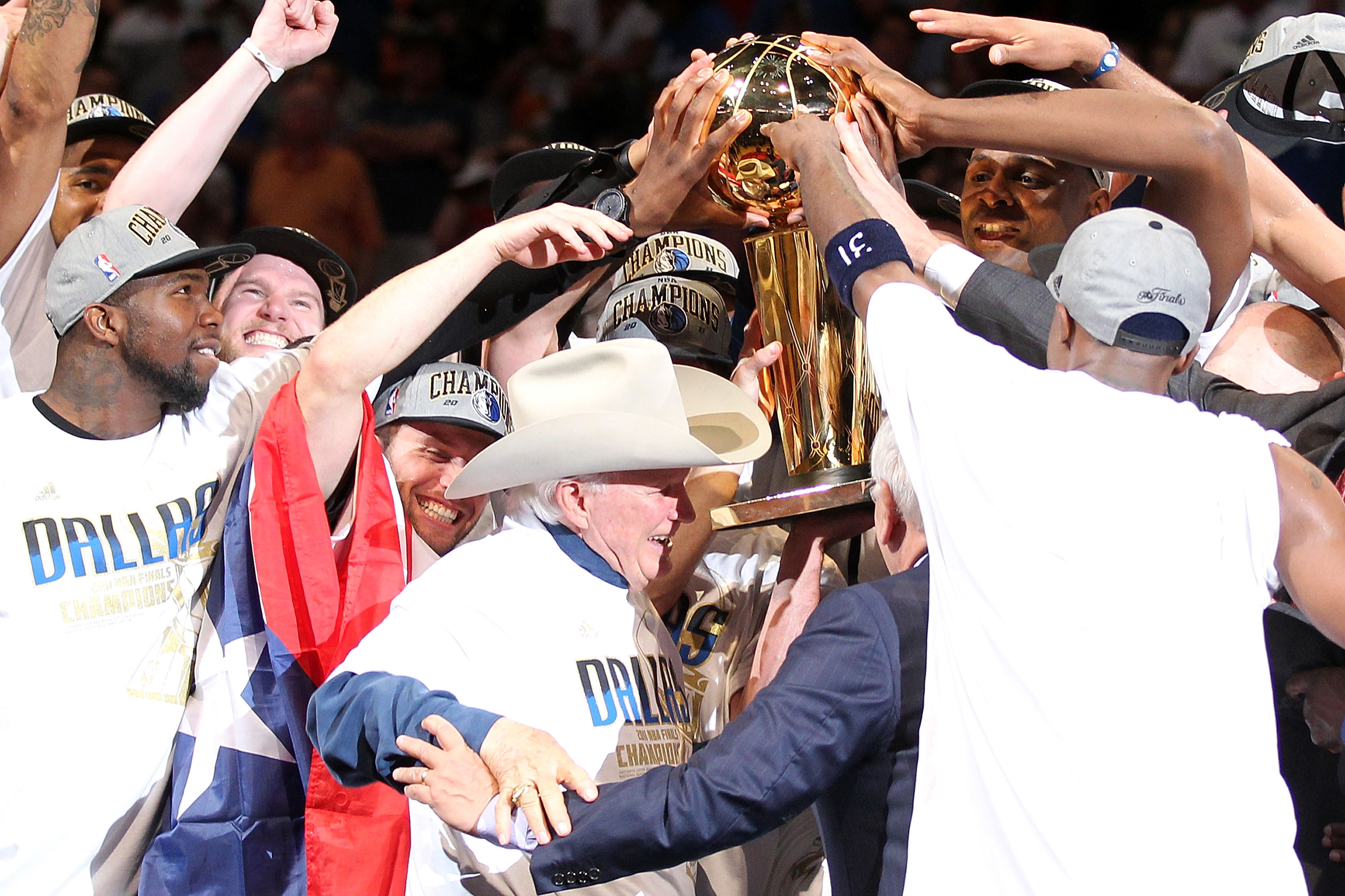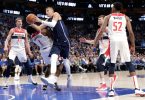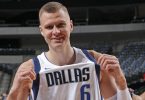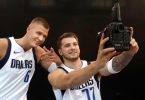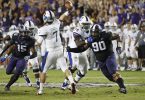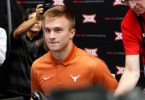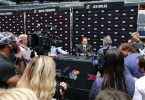Mark Cuban gets credit for the Dallas Mavericks’ highest high. Now, inexplicably, he also swallows blame for their deepest, darkest, lowest low.
The latter is no small feat, considering his predecessor Ross Perot Jr. revealed at his introductory press conference that he didn’t know how many players were on the court, and that founding father Don Carter presided over America’s worst professional sports organization of the 1990s – an outfit that went 24-140 over a two-year span, scored an NBA record-low two points in a quarter, traded away future Hall of Famer Jason Kidd, bestowed multiple forgiveness to chronic headaches Roy Tarpley and Dick Motta, and endured the entire decade without a winning record or post-season sniff.
Indeed, the Mav-wrecks are back. Fortunately, Mr. C. is gone.
Feeling at home
Walk into Cuban’s mansion and be met by the ground rules.
“This is home plate,” he told me during a 2000 interview at his 24,000-foot home, simultaneously handing me a Wiffle Ball bat. “Anything off the chandelier is an automatic homer.”
Walk into Perot Jr.’s house and … who are you kidding? A lowly sportswriter had a better chance at becoming an engineer at EDS than one of the buttoned-up billionaire’s houseguests.
Walk into Carter’s home and immediately feel, well, at home. The furniture was modest, the greetings always warm and the food usually hot. He also had his ground rules.
“I kindly ask you to remove your hat,” Carter said to me during a visit in 1994. “Momma taught me to never wear mine indoors, whether it’s a house, arena or, especially, church.”
While Perot was perfunctory, stuffy and vacant as Mavs owner, Cuban is brash, boisterous and so hands-on you think at times he might just choke the life out of his team. Carter, on the other hand, was the Mavericks’ Billy Graham. He respectfully took his 10-gallon headgear off when sitting courtside, but he also hung it all over his franchise. After Carter brought the NBA to Dallas in 1980, the original logo was a nod to him in the form of his hat adorning the “M”.

(Photo by Stephen Dunn/Getty Images)
In fact, behind only Tom Landry’s fedora, Carter’s Stetson is the most iconic hat in the history of DFW sports. Maybe throw in the top hat accessorized by water spicket of Cowboys’ unofficial hype man Crazy Ray, Byron Nelson’s woven wicker number and Nolan Ryan’s bold and blood-splattered Rangers’ T, but it’s a short list.
There was no “i” in Carter, but he lived to make sure you knew there were two of ’em in integrity. He was a Southern gentleman trying to charm the socks of the cold, cruel world of professional sports. An “aw, shucks” millionaire who parlayed the family’s successful Home Interiors company and his knack for relationships into the Mavericks, soccer’s Sidekicks and one of the Metroplex’s cleanest legacies.
He never played a minute of basketball, but took a liking to the sport to please wife Linda, who played for Duncanville High School. He could buy any restaurant in Dallas, but would drive out of his way for truck-stop food. He would regularly navigate an 18-wheeler packed with supplies to meet the emergency needs of a local or national disaster. And he annually would pay to close down the nearby Minyard, allowing his employees grab-all-you-can free shopping sprees at Christmas.
They don’t make men like Mr. C anymore, much less owners. Unfortunately, you can no longer recognize his team.
Downhill slide
In ’96 Carter sold to Perot Jr., who handed off to Cuban in ’00. The franchise’s shining pinnacle came in June 2011, when the Mavs won their only championship. After the Game 6 clincher in Miami, Cuban invited Carter onto the stage and handed him the trophy. There wasn’t a dry eye in the press box, or in the vast circle that appreciated Carter’s dogged character and unwavering loyalty.
From that moment, it’s been all downhill. We’re not sure where rock bottom is located.
The Mavericks that, under Carter, routinely lost with class are now, under Cuban, tanking with trash.
Recently fined $600,000 for admitting his team’s best outcomes this season are losses, Cuban’s team isn’t even good at being bad. Desperate for a lousy record and a Top 3 pick in the draft, the Mavs are instead lounging around only the league’s fifth-worst record. Dirk Nowitzki is playing remarkably in his 20th season and the future is bright for rookie Dennis Smith Jr. But, in between, the Mavs are wholly unwatchable.
Off the court, it’s worse. Much, much worse. As Sports Illustrated termed it in a scathing expose last month, it’s a “corrosive culture”.
The SI story – which detailed a workplace besieged by sexual harassment – rocked the NBA, shook MFFLs and breathed troubling new momentum into the #MeToo movement. What did Cuban know and when did he know it? How were the serial sexual advances of former CEO Terdema Ussery toward female employees unchecked, if not altogether ignored? How was an employee with two domestic violence incidents on his record allowed to maintain a high-profile position? And what will become of the ongoing investigation: Hefty fine? Lost draft pick? NBA owners forcing Cuban to sell?
In the immediate aftermath the Mavs fired a Mavs.com beat writer and hired a CEO, Cynthia Marshall. Charming and engaging, Marshall’s first month on the job was highlighted by a press conference at which she promised to make the Mavericks’ culture the model for the NBA, and raised eyebrows when she – in the same day – re-tweeted Black Lives Matter and Franklin Graham and later posted after a loss to the Toronto Raptors:
We almost upset the East #1 Team. Very proud of @dallasmavs.
I’m not sure which is more embarrassing: Openly trying to not to win. Or celebrating losing.
From Carter’s political correctness and sparkling morals to … whatever you call this. How the Hell did we get here?
It all begins with a broom.
Classy to classless
Carter was the religious right of not the Mavs, and shared Dallas’ sports pulpit with Landry. A faith-based, family-first man of principles, he refused to serve alcohol in the press room at Reunion Arena. Out of fear of exploiting women, he cringed at allowing scantily clad dancers at games. And he paid attention to every employee and every detail, once having original team general manager Norm Sonju demonstrate to the staff on how to properly operate a push broom, as to avoid injury to themselves or those around them.
When Carter sold to Perot Jr., the restrictions were loosened.
Enter Ussery, a Harvard-educated hotshot from Nike brought in to be team president, help minority marketing initiatives and be a prominent player in seeking support for a new arena, now known as American Airlines Center. He did that and, allegedly, much, much more.
I always liked Ussery. Played basketball with him at the old North Dallas Athletic Club. During our numerous casual conversations – at games or otherwise – he always had a wandering eye for attractive women. It was overt but subtle, nothing approaching outrageous. A head nod in her direction. A raised eyebrow when she walked past. An under-the-breath “mmm” in the general direction of the woman in the provocative outfit.
As a reporter for the Fort Worth Star-Telegram, I was in the perpetual mode of “see something, say something”. I wasn’t alarmed. But nor was I shocked when I got wind in the Spring of ’98 that the Mavs were conducting an internal investigation of Ussery’s conduct, in reaction to numerous complaints filed against him by female staffers. That investigation, concluded in August ’98, didn’t unearth enough inappropriateness for Ussery to be publicly reprimanded, much less lose his job.
Perot Jr. wouldn’t comment on the investigation’s findings. Ussery issued a “focused on the organization’s success” statement. And, poof, it all disappeared. With the Internet still learning to crawl, the underwhelming Mavs being a DFW afterthought and the #MeToo movement still 20 years in the future, big things had a way of remaining little things.
But privately, there were changes. Or at least, as I wrote in ’98, tweaks to the employee handbook. The Ussery investigation led to the Mavs hiring a Director of Human Resources and implementing stringent guidelines for not only workplace conduct, but also the step-by-step process for reporting sexual harassment.
Under Carter and his regime of respect, it was unwritten, common decency. With Ussery, they became known as the “T Rules”.
In the wake of the SI revelations, I contacted a former member of Perot Jr.’s front office.
“We heard the whispers from Day One with T,” the source said. “He was your typical skirt-chaser. Handsome. Charismatic. Powerful. You know. But the investigation didn’t rise to him being disciplined. Just the T Rules.”
When Cuban bought the team from Perot Jr., Ussery survived, and thrived. He won a Humanitarian Award from the Anti-Defamation League. He grew more powerful in the NBA, serving as the Mavs’ alternate governor and sometimes representing the team at owners’ meetings. He remained close friends with David Stern, and at one point was even widely considered the favorite to become the next commissioner of the NBA.
When I moved from the FWST to the Dallas Observer in ’05 I covered the Mavs not as a day-to-day beat writer, but merely from the periphery as a columnist. When I crossed paths with Ussery, I didn’t think about him weathering some storm – much less still being in the eye of it.
These days Ussery’s reputation is in tatters, Cuban’s ownership is in limbo, the Mavs’ present is in the ditch and Carter’s legacy is … likely rolling over in its fresh grave.
At Mr. C’s memorial service less than 24 hours before the SI story broke, guess who delivered the powerful eulogy?
Sure enough, Terdema Ussery.

